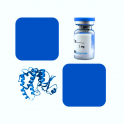
- Remove this product from my favorite's list.
- Add this product to my list of favorites.
Products
Viewed products
Newsletter
 |  |  |  |  |  |

Background
Programmed cell death protein 1 (PD-1) is also known as CD279 and PDCD1, is a type I membrane protein and is a member of the extended CD28/CTLA-4 family of T cell regulators. PDCD1 is expressed on the surface of activated T cells, B cells, macrophages, myeloid cells and a subset of thymocytes. PD-1 has two ligands, PD-L1 and PD-L2, which are members of the B7 family. PD-L1 is expressed on almost all murine tumor cell lines, including PA1 myeloma, P815 mastocytoma, and B16 melanoma upon treatment with IFN-γ. PD-L2 expression is more restricted and is expressed mainly by DCs and a few tumor lines. PD1 inhibits the T-cell proliferation and production of related cytokines including IL-1, IL-4, IL-10 and IFN-γ by suppressing the activation and transduction of PI3K/AKT pathway. In addition, coligation of PD1 inhibits BCR-mediating signal by dephosphorylating key signal transducer. In vitro, treatment of anti-CD3 stimulated T cells with PD-L1-Ig results in reduced T cell proliferation and IFN-γ secretion. Monoclonal antibodies targeting PD-1 that boost the immune system are being developed for the treatment of cancer.
Source
Recombinant Biotinylated Human PD-1, Avitag,His Tag (recommended for biopanning) (PD1-H82E4) is expressed from human 293 cells (HEK293). It contains AA Leu 25 - Gln 167 (Accession # Q15116-1).
N-terminal Sequence Analysis: Leu 25
Molecular Characterization
This protein carries an Avi tag (Avitag™) at the C-terminus, followed by a polyhistidine tag.
The protein has a calculated MW of 18.6 kDa. The protein migrates as 35-45 kDa under reducing (R) condition (SDS-PAGE) due to glycosylation.
Application
PD1-H82E4 works best for experiments that test the binding between PD-1 and candidate antibodies, such as biopanning and other relevant assays.
Biotinylation
Biotinylation of this product is performed using Avitag™ technology. Briefly, the single lysine residue in the Avitag is enzymatically labeled with biotin.
Biotin:Protein Ratio
Passed as determined by the HABA assay / binding ELISA.
Endotoxin
Less than 1.0 EU per μg by the LAL method.
Purity
>95% as determined by SDS-PAGE.
>90% as determined by SEC-MALS.
Formulation
Lyophilized from 0.22 μm filtered solution in PBS, pH7.4. Normally trehalose is added as protectant before lyophilization.
Reconstitution
Please see Certificate of Analysis for specific instructions.
For best performance, we strongly recommend you to follow the reconstitution protocol provided in the CoA.
Storage
For long term storage, the product should be stored at lyophilized state at -20°C or lower.
Please avoid repeated freeze-thaw cycles.
This product is stable after storage at:
-20°C to -70°C for 12 months in lyophilized state;
-70°C for 3 months under sterile conditions after reconstitution.
Bioactivity
Please refer to product data sheet.
(1) "Pharmacologic targeting of Nedd8-activating enzyme reinvigorates T-cell responses in lymphoid neoplasia"
Wang, Chen, Vuong et al
Leukemia (2023)
(2) "Engineering tumor-specific gene nanomedicine to recruit and activate T cells for enhanced immunotherapy"
Wang, Zhou, Wang et al
Nat Commun (2023) 14 (1), 1993
(3) "Tracking tumor-specific CD8+ T cell responses"
Burke, Markson, Sharpe
Trends Immunol (2023)
Showing 1-3 of 26976 papers.
Limited Use License
The Biotin AviTag technology is covered by U.S. Pat. No: 5,874,239 and includes any and all materials, methods, kits and related derivatives claimed by this patent. The purchase of the Acrobiosystems’s Avitag™ proteins confers to the purchaser the limited right to use the Avitag™ technology for non-commercial, or research use, or for purposes of evaluating the Avitag™ technology.
Commercial use of the Avitag™ technology to manufacture a commercial product, or use of the Avitag™ technology to facilitate or advance research which will be applied to the development of a commercial product requires a license from Avidity, LLC. Examples of Commercial use include, but are not limited to biosensors, diagnostics, therapeutic applications, proximity assays, and drug screening assays.
Recombinant Human PD-L1/B7-H1 Protein, low endotoxin, Fc Tag, 100µg - 429,00 €
Recombinant Human PD-1 / PDCD1 Protein, Fc Tag (HPLC-verified), low endotoxin,100µg - 461,50 €
Recombinant Mouse PD1 /PDCD1 Protein, Fc Tag, 100µg - 468,00 €
Recombinant Human PD-1 / PDCD1 Protein (HPLC-verified), His Tag, 100µg - 461,50 €
Recombinant Human PD-L1 / B7-H1 Protein (HPLC-verified), His tag, 100µg - 461,50 €
Recombinant Human PDL1 /CD274 / B7-H1 Protein, Twin Strep Tag, 25µg - 351,00 €
Follow us